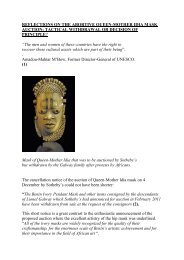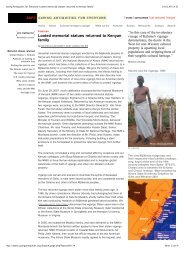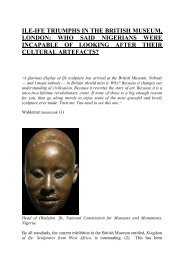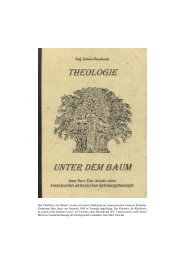RECOVERING NIGERIA'S TERRACOTTA - Afrikanet.info
RECOVERING NIGERIA'S TERRACOTTA - Afrikanet.info
RECOVERING NIGERIA'S TERRACOTTA - Afrikanet.info
Create successful ePaper yourself
Turn your PDF publications into a flip-book with our unique Google optimized e-Paper software.
egulations. Some may argue that actions speak louder than words. Professor<br />
Shyllon has written that:<br />
“It is a matter of surprise indeed that to date Nigeria which at various<br />
times served on the Intergovernmental Committee for Promoting the Return of<br />
Cultural Property to its Countries of Origin or its Restitution in Case of<br />
Illicit Appropriation (she was in fact a foundation member of the Committee)<br />
has never sought the good offices of the Committee on the matter.”(7)<br />
The general public in the rest of the world may well conclude that the Nigerian<br />
authorities are not very keen to seek the return of looted artefacts. Usually, it is<br />
very difficult to know where looted objects are and who is in possession. It is<br />
seldom that we have many such objects displayed in an exhibition and in its<br />
catalogue. A lack of interest or passivity must necessarily discourage those<br />
interested in assisting in more complicated situations. As has been amply<br />
demonstrated in public opinions polls, for example in Great Britain, the general<br />
public is in favour of returning looted objects or objects acquired under dubious<br />
circumstances. (8) Interested States must encourage or at least, not discourage<br />
this sympathetic public.<br />
In his excellent article on the Benin invasion by Britain, Prof. Akin Oyebode<br />
mentioned Zik’s reference to the “manifest destiny” of Nigeria. (9) This was a<br />
phrase used often in the days preceding and following Independence. In those<br />
days, the average school pupil understood that given its size, resources, both<br />
human and natural, that great country was destined to play an important role on<br />
our continent and thus contribute to shaping the world and the future of the<br />
African peoples. But this manifest destiny would not be fulfilled if those in<br />
charge of the administration and governance of the country do not create the<br />
conditions propitious for the fulfilment of this potential. ‘Manifest destiny’ is a<br />
potentiality and not inevitability. It is a potentiality that must be cultivated and<br />
nurtured. How is Nigeria to play its role, manifest or otherwise, if its rich<br />
cultural heritage is seen to be open to pray by all and no attempts are made to<br />
convey the message that its cultural heritage is not up for grabs by predators A<br />
great nation with a rich and old cultural heritage that does not care about<br />
protection and preservation Failure to demonstrate a resolve to preserve<br />
cultural heritage has wider implications. Not only does such a position lead to an<br />
enormous loss of prestige but also to great financial losses in so far as these<br />
objects are worth millions. It is also likely that failure or unwillingness to protect<br />
cultural heritage may be considered a symptom of general failure to protect<br />
national interests in other areas.<br />
The will and resolve to protect Nigerian cultural heritage in particular and<br />
Nigerian interests generally, must be emphasized and demonstrated in all cases<br />
in order to imprint the message on the minds of all: Nigeria’s cultural heritage<br />
belongs to Nigeria and it is intended to keep it that way.<br />
4














